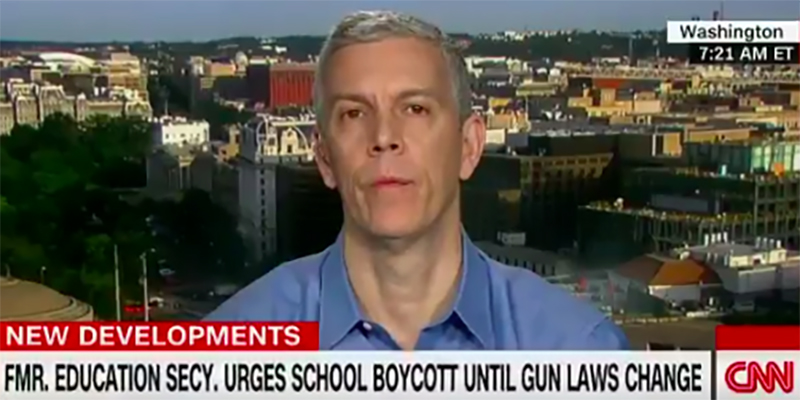Former Education Secretary Arne Duncan Endorses ‘Provocative’ Call to Curb Gun Violence: A School Boycott

Former education secretary Arne Duncan is making media waves touting an unorthodox proposal to end gun violence in schools: taking children out of class.
Speaking on CNN’s New Day on Monday, Duncan maintained that a “provocative measure” like a school boycott is needed amid the country’s seemingly stagnant response to school shootings — the latest at a Santa Fe, Texas, high school Friday that left eight students and two teachers dead and 13 others injured.
“We as parents have failed to keep our kids safe, and we need to create a tension,” said Duncan, who has school-age children. A good time for the movement, he noted, would be when many schools traditionally start classes after the Labor Day holiday.
Duncan first retweeted the idea — piggybacking off of Education Post executive director Peter Cunningham, who worked under Duncan in the Obama administration — hours after Friday’s shooting, calling the strike proposal “brilliant, and tragically necessary.” Duncan was education secretary from 2009 to 2015, and he acts as managing partner of Chicago Cred, an organization working to curb gun violence in the city. He’s also active on social media, retweeting activists and Parkland, Florida, shooting survivors David Hogg and Emma González as they call for increased youth voter registration.
Duncan was not available Monday for comment.
https://twitter.com/PCunningham57/status/997498464542978048
Cunningham, who called his former boss an “outstanding, long-standing proponent“ for gun reform, told The 74 he was inspired to circulate the idea because he believes parents can have sizable clout as contentious political races approach.
“We need voting-age people to tell members of Congress, ‘This is going to be a voting issue this fall,’ ” Cunningham said. “And if [Republican] control of Congress is at risk, maybe they’ll act.”
Secretary of Education Betsy DeVos has not weighed in publicly on the proposal, but after Friday’s tragedy she affirmed in a written statement that the recently created Federal Commission on School Safety is “working to identify proven ways to prevent violence and keep our students safe.” She’d met with past school shooting victims and their families the day before.
Many social media users have enthusiastically embraced the prospect of a strike, including education leaders such as Teach for America founder Wendy Kopp and American Federation of Teachers President Randi Weingarten.
Efraín Martínez, principal of José Clemente Orozco Academy in Chicago, taught for Chicago Public Schools (CPS) while Duncan was superintendent from 2001 to 2009. As the principal of about 550 students from pre-K to eighth grade — and the father of two elementary schoolers — Martínez said he’s tired of feeling powerless. So when he saw Duncan’s retweet, he thought the same thing: “Brilliant.”
“The people who are supposed to fix it are not fixing it, so people like us, we need to move something,” he said. “Because these are our children. These are our futures. … We are an embarrassment right now in terms of how many shootings happen in comparison to what we have done to solve it.”
Others have offered hesitant optimism, pointing to possible truancy or the financial burden a boycott could place on families who work.
https://twitter.com/mageencaines/status/997579454116433920
https://twitter.com/RockelleHend/status/997644283992735744
Duncan admitted to The Washington Post that a parent strike would be “wildly impractical and difficult.”
“I’m open to other ideas, I’m open to different ideas,” he said. “But I’m not open to doing nothing.”
Get stories like these delivered straight to your inbox. Sign up for The 74 Newsletter

;)
